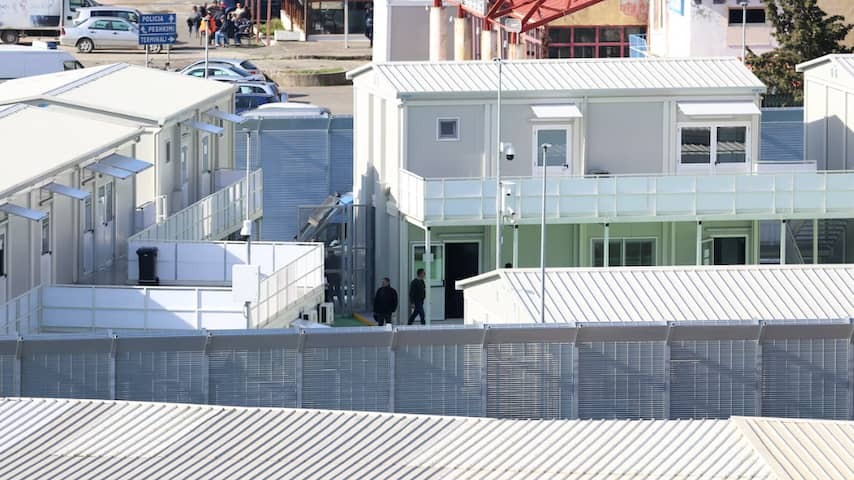
The Outgoing Cabinet is working on a plan to accommodate rejected asylum seekers in Uganda. The only other European Example of a so-called Return Hub, in Albania, Shows Accordination to Experts Why It is a Bad Idea. “People are stuck in no man’s country.”
The Plan is to Send Asylum Seekers from Countries Near Uganda Temporarily to the East African Country. There they will stay until they can return to their country of origin or are tasks in by Another Country in the region. It is Still Unclear When that will Happen and What Uganda Will Receive in Return.
Other European Countries also see some merit in the idea of a return hub and will be watching with interest how the Netherlands implementation this plan. Currently, Only Italy Has a Similar Deal with Albania to Learn from. The Original Idea was to intercept Asylum Seekers and Route to Italy by Boat and Bring Them to Albania So They Could Await Their Process There. But the Judge Put A Stop to that.
The reception in The Albanian Village of Gjader Has Therefore served as an Italian Return Hub for Rejected Asylum Seekers Since April. But Mep Mep Anna Strolenberg Cannot Call it a ‘Reception’. She visited the hub in May, which can be seen in the photo above the article, and prefers to call it a prison. “People have to stay in a small room with bars on the Windows with four people,” She Tells Nu.nl.
The Asylum Seekers Are Not Allowed to Leave the Premises And Can Only Get Some Fresh Air in A Small Courtyard. Many of the People Strolenberg Spoke to Did Not Know Why Were Being Held, How Long They would have to stay, and what their procedure would look like. “They are there without distraction and without clarity about their situation. It is hopeless.” She Noticed That Migrants Therefore Resorted to Drugs. “They were very dazed.”
Secrecy Creates Conerns About Human Rights
Journalists, Aid Organizations and Experts Are Further In The Dark About The Situation of the Migrants in Albania. Only political representatives can gain access to the hub and, accordance to Strolenberg, that is a difficult process. Furthermore, The Italian Government Provides No Transparency, Not equally about how many people have been sent to the hub.
Strolenberg Saw Documents on site and from them she could see that there have bone at Least 84 People. But some people have also leg sent back to Italy due to health problems.
That Secrecy Surrounding the Return Hub is Partly Why Lawyer Michael Yap, Who Specializes in Migration Law, is Skeptical about the Prominent Deal Between the Netherlands and Uganda. “If it is already difficult to check whether agreements are Being Complied with in a European Country Like Albania, How Will the Netherlands do that in Uganda?”
Accordance to senior lecturer Viola Bex-Reimert (Migration Law), One of the Biggest Objections is that the Netherlands may not be able to Guarantee the Human Rights of Migrants in Uganda. “Actually, it’s just outsourcing the problem. If the problem is further away, people can no longer see it and it seems solved.”
‘Money is Better Spent’
But a Real Solution Remains Elusive, experts Emphasize. Because the country of origin does not want to take back a rejected asylum seeker, it does not matter where they are being hero. “Then the Netherlands can send them to uganda, but it is not the case that the country of origin Will Suddenly Want to Coopereate,” Says Strolenberg. “You see the same thing happening in Albania. People are stuck there in a child of no man’s country.”
Italy Has Paid Billions for the Return Hub in Albania. And AltheHe IT is Still Unclear What Uganda Wants in Return For Acceptance Rejected Asylum Seekers, Yap Expects That It Will also Cost The Netherlands A Lot Of Money. Accordance to him, that money can be better spent on making its own Return Program More effective. “Now the Netherlands Thinks it can Easily Get Rid or It with a Bag of Money.”
Ensure That The Immigration and Naturalization Service (IND), For Example, Has More Manpower, Strolenberg Adds. She also Advocates Faster procedures, more reception places and better cooperation with countries that do not want to take back their asylum seekers. “It’s hardly about real solutions anymore. The cabinet can really spend all that money in a better way.”